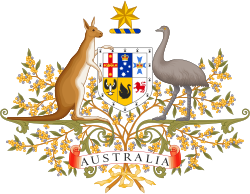Bropho v Western Australia
Bropho v Western Australia was a decision of the High Court of Australia, which ruled on 20 June 1990 that Section 17 of the Aboriginal Heritage Act 1972 of Western Australia bound the Crown in right of Western Australia.
| Bropho v Western Australia | |
|---|---|
 | |
| Court | High Court of Australia |
| Full case name | Bropho v State of Western Australia and Another |
| Decided | 20 June 1990 |
| Citation(s) | [1990] HCA 24 |
| Court membership | |
| Judge(s) sitting | Mason CJ, Deane, Dawson, Toohey, Gaudron, McHugh and Brennan JJ |
Background
Legislation
Section 17 of the Aboriginal Heritage Act 1972 of Western Australia prohibited the destruction or damage of aboriginal sites except with the consent of the responsible state minister. The Act did not expressly say whether it bound the Crown,[1] although the Act provided that it applied to "all places" in Western Australia.[2]
Facts

The Western Australian Development Corporation, a statutory corporation of the Western Australian government, undertook works to redevelop the prominent Swan Brewery site in Perth. The site was owned by the State of Western Australia.[3][4] Robert Bropho, an Indigenous Australian activist, applied to the Supreme Court of Western Australia for an injunction against the development, claiming it was sacred Aboriginal land. Although Section 17 of the Aboriginal Heritage Act 1972 established a criminal offence, Bropho sought the civil remedy of an injunction.[5] The Supreme Court refused to grant an injunction, holding that the Aboriginal Heritage Act 1972 did not bind the Crown in right of Western Australia. An appeal to the full bench of the Supreme Court failed, following which Bropho instituted a further appeal to the High Court of Australia.[6]
Crown immunity before Bropho
Before Bropho, the law of Crown immunity in Australia was governed by Province of Bombay v Municipal Council of Bombay, a 1946 judgment of the Privy Council of the United Kingdom. The Privy Council held that there was a presumption that a statute did not bind the Crown. The presumption was only rebuttable by express words or "necessarily implication".[7] The Privy Council narrowed the necessary implication ground to circumstances where the purpose of the statute would be "wholly frustrated" if the statute did not bind the Crown.[8]
Judgment
The High Court unanimously upheld Bropho's appeal, holding that Section 17 of the Aboriginal Heritage Act 1972 bound the Crown in right of Western Australia. Chief Justice Mason and Justices Deane, Dawson, Toohey, Gaudron and McHugh delivered a joint judgment. Justice Brennan delivered his own judgment that concurred with the joint judgment.[9]
Joint judgment
The joint judgment affirmed the presumption against a statute binding the Crown. However, the judgment overturned the Bombay requirement that the presumption could only be rebutted by express words or necessary implication, criticising it as an "inflexible rule". According to the joint judgment, the relevant question was whether Parliament intended for the statute to bind the Crown. The intention of Parliament could be ascertained by reference to the content and objectives of the statute.[10]
Justice Brennan
Justice Brennan concurred with the joint judgment, noting his view that employees and agents of the Crown should not be exempt from criminal laws.[11]
Subsequent action
Bropho's successful appeal did not prevent the redevelopment of the Swan Brewery. Later in 1990, Minister Carmen Lawrence gave her consent to the redevelopment, overriding the prohibition in Section 17 of the Aboriginal Heritage Act 1972. Bropho successfully challenged Lawrence's decision in the Supreme Court of Western Australia, but the Western Australian government won on appeal to the Court of Appeal.[12]
References
Footnotes
- Katz 1994, p. 223
- Taylor 2000, p. 107
- Starke 1990, p. 527
- Churches 1990, p. 690
- Barrett 2002, p. 59
- Australian Law Reports 1990, p. 207
- Katz 1994, pp. 222–223
- Gray 2009, p. 201
- Churches 1990, p. 690
- Taylor 2000, pp. 107–108
- Taylor 2000, p. 109
- Churches, Steven (1992). "Aboriginal Heritage in the Wild West – Robert Bropho and the Swan Brewery Site". Aboriginal Law Bulletin. Kensington, NSW: Aboriginal Law Research Unit. 27. ISSN 0728-5671. Archived from the original on 3 May 2007.
Cited texts
- Bropho v State of Western Australia (1990), Australian Law Reports 93: 207-209 (case note).
- Barrett, Malcolm (2002), "Prosecuting the Crown", University of Notre Dame Australia Law Review, Fremantle, WA: University of Notre Dame Australia, 4: 39–75, ISSN 1441-9769
- Churches, S C (1990), "The Trouble with Humphrey in Western Australia: Icons of the Crown or impediments to the public?", University of Western Australia Law Review, Nedlands, WA: Faculty of Law, University of Western Australia, 20: 688–709, ISSN 0042-0328
- Corones, Stephen (2007), "Negotiating to supply government entities: when does the Trade Practices Act apply?", Australian Business Law Review, Sydney: Thomson LBC, 35: 374–378, ISSN 0310-1053
- Gray, Anthony (2009), "Options for the doctrine of Crown immunity in 21st century Australia", Australian Journal of Administrative Law, North Ryde, NSW: Law Book Co., 16: 200–210, ISSN 1320-7105
- Katz, Leslie (1994), "The test for Determining the Applicability to the States of Federal Statutes Which Do Not Expressly Bind Them", Australian Bar Review, Sydney: Butterworths, 11: 222–228, ISSN 0814-8589
- Starke, J G (1990), "Current Topics: The High Court's new approach to the question whether the Crown is bound by a statute", Australian Law Journal, Sydney: Law Book Co., 64: 527–530, ISSN 0004-9611
- Taylor, Greg (2000), "Commonwealth v Western Australia and the Operation in Federal Systems of the Presumption that Statutes do not Apply to the Crown", Melbourne University Law Review, Melbourne: Melbourne University Law Review Association, 24: 77–123, ISSN 0025-8938
- Thomson, James A (1990), "Beyond superficialities: Crown immunity and Constitutional law", University of Western Australia Law Review, Nedlands, WA: Faculty of Law, University of Western Australia, 20: 710–725, ISSN 0042-0328